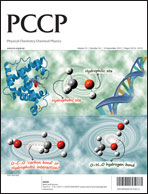A microiterative intrinsic reaction coordinate method for large QM/MM systems
Abstract
Intrinsic reaction coordinate (IRC) computations are a valuable tool in theoretical studies of chemical reactions, but they can usually not be applied in their current form to handle large systems commonly described by quantum mechanics/molecular mechanics (QM/MM) methods. We report on a development that tackles this problem by using a strategy analogous to microiterative transition state optimization. In this approach, the IRC equations only govern the motion of a core region that contains at least the atoms directly involved in the reaction, while the remaining degrees of freedom are relaxed after each IRC step. This strategy can be used together with any existing IRC procedure. The present implementation covers the stabilized Euler, local quadratic approximation, and Hessian predictor–corrector algorithms for IRC calculations. As proof of principle, we perform tests at the QM level on small gas-phase systems and validate the results by comparisons with standard IRC procedures. The broad applicability of the method is demonstrated by IRC computations for two enzymatic reactions using standard QM/MM setups.


 Please wait while we load your content...
Please wait while we load your content...